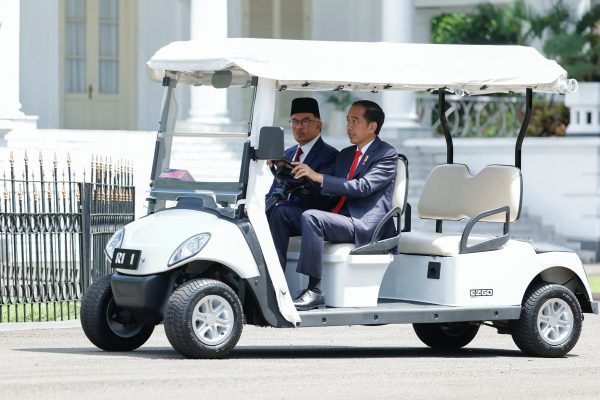Without denying the countless differences that differentiate Indonesia from Malaysia, it’s timely to consider the parallels now emerging in the two neighbours’ political trajectories. Dramatic divergence is giving way to creeping convergence.
Both countries have travelled parallel paths from authoritarian hegemony towards polarising pluralism. From the late 1960s until the late 1990s, Indonesia and Malaysia were both dominated by their respective authoritarian ruling elites. When crisis struck Indonesia in 1998, violent anti-government demonstrations pushed the Suharto family from power. The military and the dominant party, Golkar, were forced to share power with an eclectic array of elected politicians.
Meanwhile in Malaysia, Mahathir Mohamad remained in power, fiercely repressing the multiethnic opposition that emerged behind his sacked deputy Anwar Ibrahim. The ruling United Malays National Organisation (UMNO) and its Barisan Nasional (BN) coalition partners comfortably retained their authoritarian hegemony — but they were already on borrowed time.
Twenty-five years later, authoritarian hegemony has finally died in Malaysia just as it did decades ago in Indonesia. Mahathir suffered a crushing defeat in the 2022 vote that has left him as repudiated and irrelevant as Suharto. The party and coalition that he commanded, UMNO and BN, are not looking much healthier. After winning supermajorities in every national election from 1955 to 2004, UMNO’s ruling coalition has slipped in each subsequent election to be relegated to Malaysia’s third-largest electoral bloc. As in Indonesia, the electorate in Malaysia is now splintered behind a handful of parties rather than concentrated behind a hegemonic party.
There are also parallels in what this decline has meant for old dominant parties. In their countries’ transitions from authoritarian hegemony to polarising pluralism, Golkar and UMNO have gone from kings to kingmakers. Over two decades after Indonesia’s democratisation, Golkar has still never been forced into opposition despite its precipitous electoral decline, because it always finds ways to share executive power with Indonesia’s electoral winners.
UMNO has just pulled off a similar trick. Despite getting hammered in the 2022 election, UMNO and its limping BN coalition have stayed out of opposition — and potential oblivion — by sharing power with the Pakatan Harapan coalition led by Prime Minister Anwar Ibrahim.
In both Malaysia and Indonesia, we see the lingering relevance not only of ‘authoritarian successor parties’, namely UMNO and Golkar, but of ‘authoritarian diasporas’, in which former Golkar and UMNO elites have established and populated a variety of other leading parties.
For all the talk of UMNO’s demise, the party has not been removed from power, despite its ever-worsening electoral defeats. The Malay nationalist coalition that has now superseded it, Perikatan Nasional (PN), is basically an Islamicised offshoot of BN. UMNO is on the ropes, but UMNO’s founding idea – Malay supremacy – still stands tall.
The shadows that UMNO and Golkar elites have cast across Malaysia and Indonesia are longer than the old parties themselves.
Far more than during Malaysia and Indonesia’s authoritarian eras, the divide between government and opposition is assuming a worrisome ethno-religious colour. From the 1960s to the 1990s, the lasting divide between Islamist and pluralist forces was softened by the reigning national philosophy of Pancasila in Indonesia and by UMNO’s leadership of a multi-ethnic coalition in Malaysia.
One reason why Malaysian and Indonesian authoritarianism were as stable as they were in this era was because politics was never reduced to conflict between governments and oppositions comprised of opposing ethnic blocs. Authoritarian governments and democratic oppositions in both Indonesia and Malaysia were similarly pluralistic.
Now the governments of Malaysia and Indonesia are far more pluralistic than their opponents. Religious minorities find representation in both governments, despite historical worries that democracy would translate into the tyranny of Muslim majorities.
But the shift from authoritarian hegemony to polarising pluralism has had a less salutary effect on political oppositions. Oppositions in both countries are now entirely Islamic oppositions. The cleavage between Islamism and pluralism has sharpened as a result.
Polarisation is just gathering steam in Malaysia, even as it has recently undergone a striking reversal in Indonesia. The PN coalition that leads Malaysia’s opposition is not simply a Malay nationalist force like UMNO has always been — it links UMNO with an increasingly conservative Parti Islam Se-Malaysia (PAS), Malaysia’s leading Islamic party, which now holds more seats in parliament than any other.
It remains to be seen how a more democratic Malaysia might fight off the virus of polarisation. In Indonesia, entrenched patterns of ‘promiscuous power sharing’ have long softened the pluralist–Islamist divide. Recent efforts at ‘counter-polarisation’ have lowered the temperature of religious tensions, but only by raising the risk that Indonesia’s old authoritarian elite will reconstitute itself at democracy’s expense.
For Malaysia, polarising pluralism is uncharted waters. We still do not know if either Malaysia or Indonesia will succeed at fending off the worst aspects of polarisation without plunging straight back into authoritarian hegemony.
Dan Slater is the James Orin Murfin Professor of Political Science and Director of the Weiser Center for Emerging Democracies at the University of Michigan.

